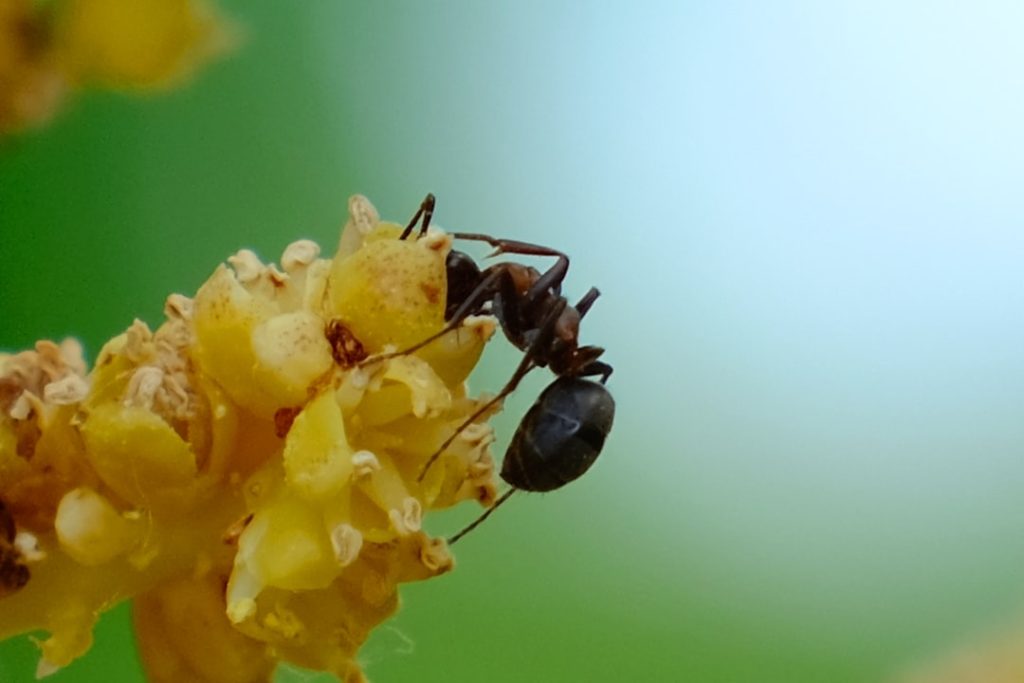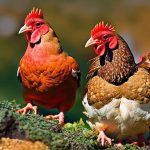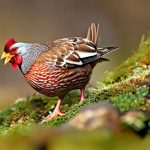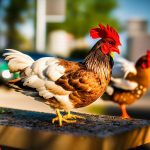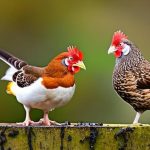Ants are attracted to chickens and their coops for several reasons. Chickens are messy eaters, often leaving behind food scraps and spilled feed, which serve as a food source for ants. Chicken droppings and bedding materials create a warm, moist environment ideal for ant nesting.
Some types of chicken feed produce sweet nectar, which is particularly appealing to ants, especially in warm and humid climates. Once ants establish a presence in a chicken coop, they can be difficult to eradicate due to their rapid reproduction and ability to find hidden nesting spots. Ants are adept at locating nooks and crannies to build their nests, making infestations challenging to eliminate.
The combination of readily available food and suitable shelter makes chicken coops attractive to ants. Understanding these factors is essential for developing effective prevention and control strategies. Recognizing the reasons why ants are drawn to chickens is the first step in addressing and preventing infestations in poultry environments.
Table of Contents
- 1 Creating a Clean and Tidy Environment for Your Chickens
- 2 Using Natural Repellents to Deter Ants
- 3 Implementing Physical Barriers to Keep Ants Away
- 4 Regularly Inspecting and Maintaining Chicken Coops and Surrounding Areas
- 5 Seeking Professional Help for Severe Ant Infestations
- 6 Monitoring and Adjusting Your Ant Prevention Methods
- 7 FAQs
Key Takeaways
- Ants are attracted to chickens because of the food and water sources in the coop, as well as the warmth and shelter it provides.
- Keeping the chicken coop clean and free of food and water spills can help deter ants from being attracted to the area.
- Natural repellents such as citrus peels, vinegar, and essential oils can be used to deter ants from entering the coop.
- Physical barriers such as diatomaceous earth, cinnamon, and mint can be used to create a barrier that ants will not cross.
- Regularly inspecting and maintaining the chicken coop and surrounding areas can help prevent ant infestations from occurring.
- If the ant infestation is severe, it may be necessary to seek professional help to effectively eliminate the problem.
- It is important to monitor the effectiveness of your ant prevention methods and make adjustments as needed to keep ants away from the chicken coop.
Creating a Clean and Tidy Environment for Your Chickens
Eliminate Food Sources and Reduce Moisture
Regularly removing food scraps and spilled feed, as well as promptly cleaning up chicken droppings and soiled bedding materials, can help eliminate potential food sources and reduce moisture levels. This makes the environment less appealing to ants.
Proper Storage and Waste Management
Storing chicken feed in sealed containers can prevent ants from accessing and contaminating the feed. Implementing proper waste management practices, such as composting chicken droppings and soiled bedding, can help reduce the likelihood of ant infestations. By properly managing waste materials, you can minimize the availability of food and nesting sites for ants.
Regular Cleaning and Maintenance
Regularly cleaning and maintaining the chicken coop not only promotes a healthier environment for your chickens but also serves as a crucial step in ant prevention. This includes removing food scraps and spilled feed, cleaning up chicken droppings and soiled bedding materials, and storing chicken feed in sealed containers. Proper waste management practices, such as composting waste materials, can also help reduce the availability of food and nesting sites for ants. Regular cleaning and maintenance not only benefits your chickens’ health but also plays a key role in deterring ants from infesting the coop.
Using Natural Repellents to Deter Ants
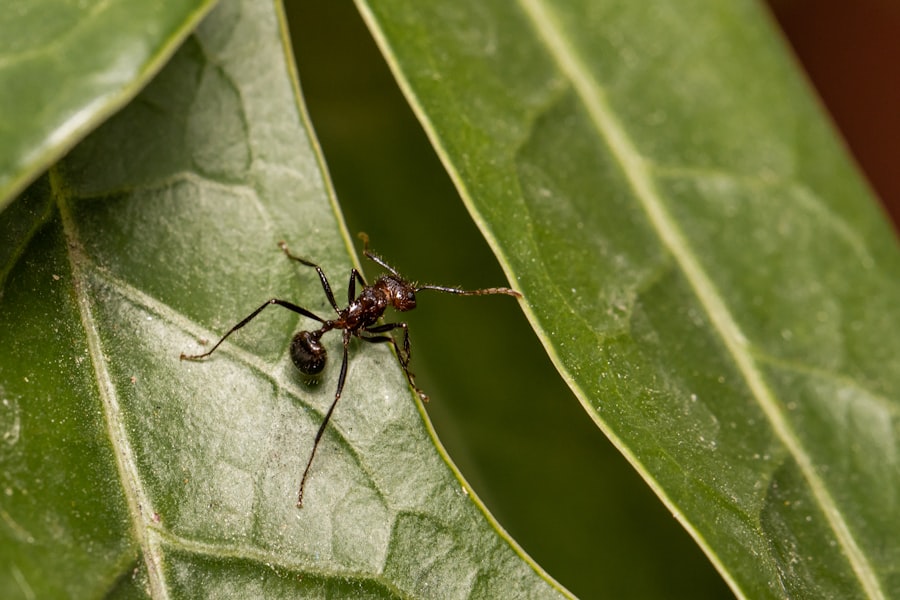
In addition to maintaining a clean environment, natural repellents can be used to deter ants from infiltrating chicken coops. Certain scents, such as peppermint, citrus, or cinnamon, are known to repel ants due to their strong odor. By strategically placing these natural repellents around the perimeter of the chicken coop or near potential entry points, you can create a barrier that discourages ants from entering the area.
Additionally, diatomaceous earth, a natural substance made from fossilized remains of diatoms, can be sprinkled around the coop to create a physical barrier that deters ants without posing harm to chickens. Moreover, vinegar and water solutions can be used to clean and disinfect the chicken coop while also repelling ants. The strong scent of vinegar disrupts ants’ pheromone trails, making it difficult for them to navigate and locate food sources within the coop.
Regularly spraying vinegar and water solutions in and around the coop can help deter ants from establishing a presence. Utilizing natural repellents not only helps keep ants at bay but also minimizes the use of harsh chemicals that may pose risks to chickens and their eggs. Natural repellents such as peppermint, citrus, cinnamon, diatomaceous earth, and vinegar can be used to deter ants from infiltrating chicken coops.
These natural substances create barriers that discourage ants from entering the area or disrupt their ability to locate food sources within the coop. By utilizing natural repellents, you can effectively deter ants without exposing your chickens to harmful chemicals. Regular application of these natural repellents can help maintain an ant-free environment in and around the chicken coop.
Implementing Physical Barriers to Keep Ants Away
In addition to natural repellents, physical barriers can be implemented to keep ants away from chicken coops. Sealing cracks and crevices in the coop’s structure with caulk or silicone can prevent ants from finding entry points into the building. Additionally, installing door sweeps and weather stripping can help create a tight seal that prevents ants from sneaking into the coop through gaps around doors and windows.
By eliminating potential entry points, you can significantly reduce the likelihood of ant infestations in the chicken coop. Furthermore, creating a moat of water around the base of the coop can serve as a physical barrier that deters ants from crossing into the area. Ants are unable to swim and will avoid crossing bodies of water whenever possible.
By maintaining a moat around the coop or placing water-filled barriers at entry points, you can effectively prevent ants from gaining access to the coop. Implementing physical barriers is an important aspect of ant prevention that complements other strategies such as maintaining a clean environment and using natural repellents. Physical barriers such as sealing cracks and crevices, installing door sweeps and weather stripping, and creating water moats around the base of the coop can effectively keep ants away from chicken coops.
By eliminating potential entry points and creating barriers that deter ants from crossing into the area, you can significantly reduce the risk of ant infestations. Implementing physical barriers is an important component of comprehensive ant prevention that works in conjunction with other strategies to maintain an ant-free environment for your chickens.
Regularly Inspecting and Maintaining Chicken Coops and Surrounding Areas
Regular inspections and maintenance of chicken coops and surrounding areas are essential for preventing ant infestations. Inspecting the coop for signs of ant activity, such as trails of ants or small nests, allows you to identify potential issues early on and take proactive measures to address them. Additionally, maintaining proper ventilation and drainage in the coop helps reduce moisture levels, making the environment less hospitable for ants to nest.
Moreover, keeping the surrounding areas free of debris, overgrown vegetation, and standing water helps minimize potential nesting sites for ants near the coop. By regularly mowing grass, trimming vegetation, and removing clutter around the coop, you can create an environment that is less attractive to ants. Regular inspections and maintenance not only help prevent ant infestations but also contribute to overall cleanliness and hygiene in and around the chicken coop.
Regularly inspecting and maintaining chicken coops and surrounding areas is crucial for preventing ant infestations. Inspections allow you to identify signs of ant activity early on and take proactive measures to address potential issues. Proper ventilation and drainage in the coop help reduce moisture levels, while keeping surrounding areas free of debris and standing water minimizes potential nesting sites for ants.
Regular maintenance not only prevents ant infestations but also promotes cleanliness and hygiene in the chicken coop environment.
Seeking Professional Help for Severe Ant Infestations
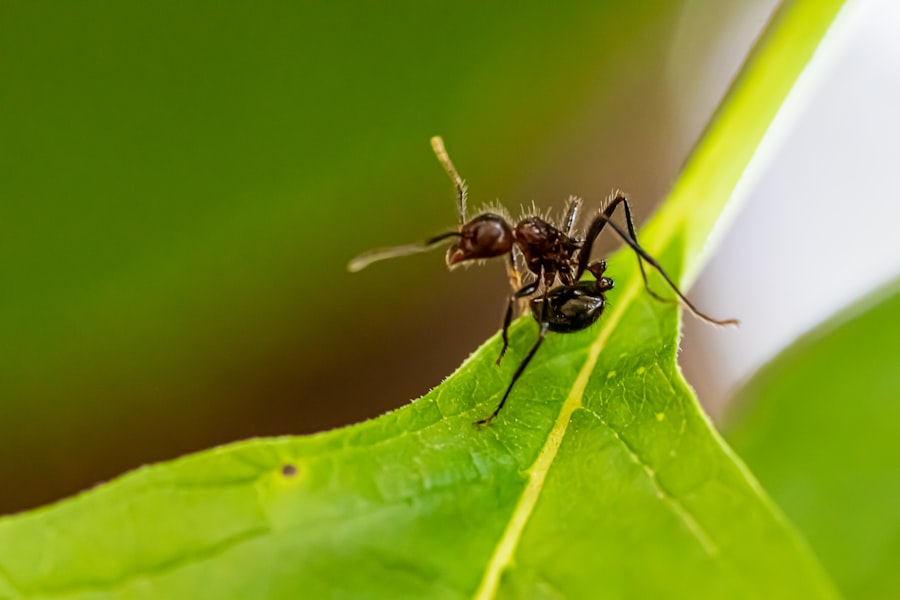
Expertise and Resources for Effective Solutions
In cases of severe ant infestations that cannot be effectively managed through DIY methods, seeking professional help is recommended. Pest control professionals have the expertise and resources to assess the extent of an ant infestation and implement targeted solutions to eradicate the problem. They can also provide guidance on long-term prevention strategies to minimize the risk of future infestations.
Safe and Effective Treatment Options
Furthermore, professional pest control services offer safe and effective treatment options that are specifically designed to eliminate ants while ensuring the safety of chickens and other animals on your property. By enlisting the help of professionals, you can address severe ant infestations with confidence and protect the well-being of your chickens.
Why Professional Help is Crucial
Pest control professionals have the expertise to assess the extent of an infestation and implement targeted solutions for eradication. They also offer safe treatment options designed to eliminate ants while ensuring the safety of chickens on your property. Enlisting professional help is crucial for addressing severe ant infestations and protecting the well-being of your chickens.
Monitoring and Adjusting Your Ant Prevention Methods
Once you have implemented ant prevention methods, it is important to monitor their effectiveness and make adjustments as needed. Regularly inspecting the chicken coop for signs of ant activity allows you to assess whether your prevention strategies are working or if additional measures are necessary. If you notice persistent ant activity despite your efforts, consider reevaluating your prevention methods and making necessary adjustments.
Moreover, environmental factors such as changes in weather or seasonal patterns can impact ant behavior and activity levels. Being mindful of these factors allows you to adapt your prevention strategies accordingly. By staying vigilant and proactive in monitoring ant activity and adjusting prevention methods as needed, you can maintain an ant-free environment for your chickens.
Monitoring the effectiveness of your ant prevention methods is essential for maintaining an ant-free environment for your chickens. Regular inspections allow you to assess whether your prevention strategies are working or if adjustments are necessary. Environmental factors such as changes in weather or seasonal patterns can impact ant behavior, so being mindful of these factors helps you adapt your prevention strategies accordingly.
By staying vigilant and proactive in monitoring ant activity and making necessary adjustments, you can effectively prevent ant infestations in your chicken coop. In conclusion, preventing ant infestations in chicken coops requires a multi-faceted approach that addresses both attractants and deterrents for ants. Understanding why ants are attracted to chickens allows for targeted prevention strategies such as maintaining a clean environment, using natural repellents, implementing physical barriers, regularly inspecting and maintaining coops, seeking professional help when necessary, and monitoring prevention methods for effectiveness.
By implementing these comprehensive strategies, chicken owners can effectively prevent ant infestations and create a healthy environment for their flock.
If you’re looking for more tips on keeping your chickens safe and healthy, check out this article on choosing the right flooring for your chicken coop. A well-designed coop can help prevent pests like ants from bothering your flock.
FAQs
What are some natural ways to keep ants off chickens?
Some natural ways to keep ants off chickens include using diatomaceous earth, applying essential oils such as peppermint or tea tree oil, and using food-grade DE or cinnamon around the coop and nesting areas.
Why is it important to keep ants off chickens?
Ants can be a nuisance to chickens as they can bite and irritate the birds. In some cases, ants can also infest chicken feed and water, leading to contamination and potential health issues for the chickens.
How can ants affect chickens?
Ants can irritate and stress chickens, leading to decreased egg production and overall health issues. In some cases, ants can also carry diseases that can be harmful to chickens.
What are some signs that ants are bothering chickens?
Some signs that ants are bothering chickens include the birds being agitated, constantly scratching or pecking at their feathers, and avoiding certain areas of the coop or run where ants may be present.
Are there any commercial products available to keep ants off chickens?
Yes, there are commercial products such as ant repellent sprays and powders specifically designed to keep ants away from chickens. It’s important to carefully follow the instructions and ensure that the products are safe for use around chickens.
Meet Walter, the feathered-friend fanatic of Florida! Nestled in the sunshine state, Walter struts through life with his feathered companions, clucking his way to happiness. With a coop that’s fancier than a five-star hotel, he’s the Don Juan of the chicken world. When he’s not teaching his hens to do the cha-cha, you’ll find him in a heated debate with his prized rooster, Sir Clucks-a-Lot. Walter’s poultry passion is no yolk; he’s the sunny-side-up guy you never knew you needed in your flock of friends!

